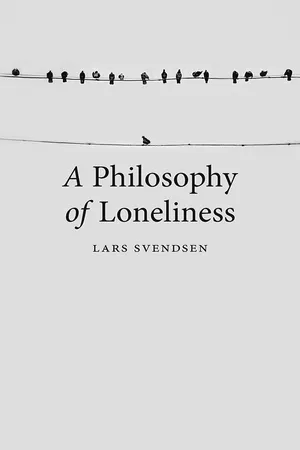
- English
- ePUB (mobile friendly)
- Available on iOS & Android
A Philosophy of Loneliness
About this book
For many of us it is the ultimate fear: to die alone. Loneliness is a difficult subject to address because it has such negative connotations in our intensely social world. But the truth is that wherever there are people, there is loneliness. You can be lonely sitting in the quiet of your home, in the still of an afternoon park, or even when surrounded by throngs of people on a busy street. One need only turn on the radio to hear a crooner telling us just how lonesome we can be. In this groundbreaking book, philosopher Lars Svendsen confronts loneliness head on, investigating both the negative and positive sides of this most human of emotions. Drawing on the latest research in philosophy, psychology, and the social sciences, A Philosophy of Loneliness explores the different kinds of loneliness and examines the psychological and social characteristics that dispose people to them. Svendsen looks at the importance of friendship and love, and he examines how loneliness can impact our quality of life and affect our physical and mental health. In a provocative move, he also argues that the main problem in our modern society is not that we have too much loneliness but rather too little solitude, and he looks to those moments when our loneliness can actually tell us profound things about ourselves and our place in the world. The result is a fascinating book about a complex and deeply meaningful part of our very being.
Frequently asked questions
- Essential is ideal for learners and professionals who enjoy exploring a wide range of subjects. Access the Essential Library with 800,000+ trusted titles and best-sellers across business, personal growth, and the humanities. Includes unlimited reading time and Standard Read Aloud voice.
- Complete: Perfect for advanced learners and researchers needing full, unrestricted access. Unlock 1.4M+ books across hundreds of subjects, including academic and specialized titles. The Complete Plan also includes advanced features like Premium Read Aloud and Research Assistant.
Please note we cannot support devices running on iOS 13 and Android 7 or earlier. Learn more about using the app.
Information
Table of contents
- Front Cover
- Half Title
- Title Page
- Copyright
- Contents
- Introduction
- ONE The Essence of Loneliness
- TWO Loneliness as Emotion
- THREE Who are the Lonely?
- FOUR Loneliness and Trust
- FIVE Loneliness, Friendship and Love
- SIX Individualism and Loneliness
- SEVEN Solitude
- EIGHT Loneliness and Responsibility
- REFERENCES
- BIBLIOGRAPHY
- ACKNOWLEDGEMENTS